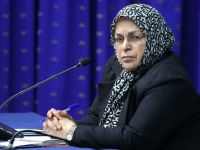As we embark on the 10th anniversary of the Syrian revolution, social media is filled with photos, videos, and personal anecdotes from Syrians remembering the hardest 10 years of Syria's modern history. What seems to be surprising though is the unusual focus on Syria's first lady Asma Al-Assad.
She grew up in London, married the president of Syria, then an uprising started. @1843mag charts the extraordinary rise of Asma Assad https://t.co/XllvZu0HuM
— The Economist (@TheEconomist) March 13, 2021
While she was considered one of the few forces "leading reforms" in the country, following her marriage to Syria's young new president in the year 2000, thanks to her background being born and raised in the UK, Asma was quickly part of the Syrian regime's message to the world in the wake of the popular protests, that were part of the 2011 Arab Spring, that her country was under a foreign attack that demanded a heavy military reaction.
This week, several global publications have taken the time to shed light on Asma Al-Assad's background, her marriage to Bashar, and her involvement in public life prior to and after the 2011 revolution.
She is 10 years, when she was born it was the year that Syrian revolution out set. We will never give up asking for our freedom. She became to led this protest. #SyrianRevolution pic.twitter.com/UASNNE3853
— Majd khalaf (@majdkhalaf1993) March 14, 2021
Ten years later, the Syrian revolution is not over, @JoshRogin writes https://t.co/QrdJSM3iJS
— Washington Post Opinions (@PostOpinions) March 12, 2021
A lengthy report by the Economist has detailed how the young J.P. Morgan banker tried to present a modern and open Syria to the world, one that could "attract foreign investments." It also highlights her complicated relationship with the Assad family, notably Bashar's mother, who passed away in 2016.
Moreover, the report talks about the lavish lifestyle that Asma led even during the first months of the revolution, which resulted in millions of refugees displaced worldwide, hundreds of thousands of deaths, in addition to the destruction of many Syrian cities.
Finally, the Economist notes that Asma's last several years were focused on her battle with breast cancer, which she announced full recovery from in 2019.
I have a lot of problems with this profile of Asma Assad, and it primarily has to do with the fact that when an Arab leader is accused of corruption rather than bloodshed, they're being sold as alternative West can work with without too many moral qualms https://t.co/igNf1I6aWS
— Kareem Shaheen (@kshaheen) March 11, 2021
Syria’s Asma al-Assad faces police investigation in the UK https://t.co/tNA8pzQe4y pic.twitter.com/XrHbTpTjJJ
— Al Jazeera News (@AJENews) March 14, 2021
Yet, the last week has also witnessed a number of global developments with Asma Al-Assad's name in the light, such as the Metropolitan police's decision to start a preliminary investigation into allegations of incitement on terror war crimes committed by Syrian government forces, ones that could cost Asma her British citizenship.







